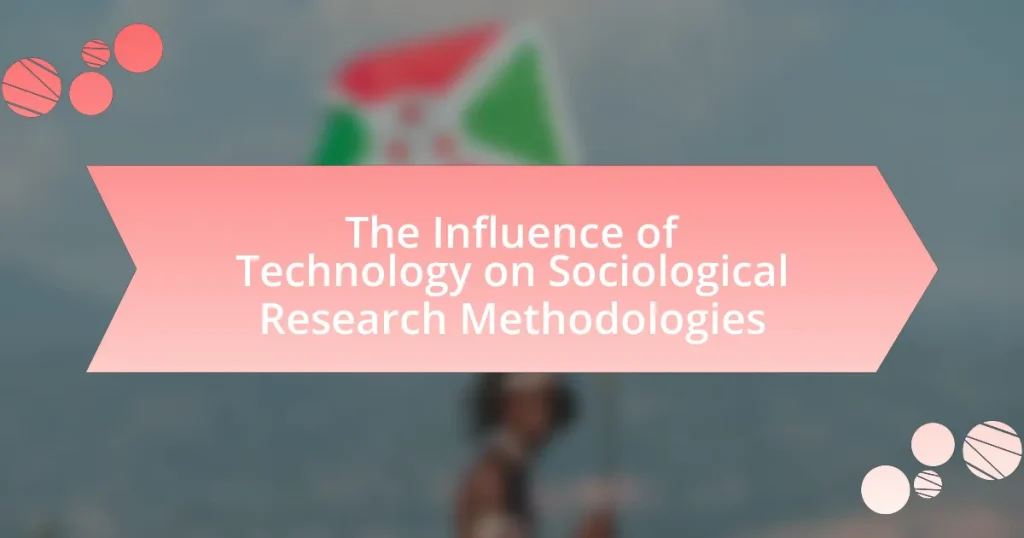The article examines the significant influence of technology on sociological research methodologies, highlighting advancements such as big data analytics, online surveys, and social media analytics. It discusses how these technologies enhance data collection, analysis, and dissemination, leading to more efficient and nuanced insights into social behaviors. Key topics include the transformation of traditional research methods, the implications for research validity and reliability, ethical considerations, and the future trends in sociological research driven by emerging technologies like artificial intelligence and machine learning. The article emphasizes the necessity for sociologists to adapt their skills and methodologies to leverage these technological advancements effectively.

What is the Influence of Technology on Sociological Research Methodologies?
Technology significantly influences sociological research methodologies by enhancing data collection, analysis, and dissemination processes. The integration of digital tools, such as online surveys and social media analytics, allows researchers to gather large datasets quickly and efficiently, which was not feasible with traditional methods. For instance, a study published in the “American Journal of Sociology” highlights that the use of web-based surveys can increase response rates and reduce costs compared to paper-based surveys. Additionally, advanced statistical software and machine learning algorithms enable sociologists to analyze complex data patterns, leading to more nuanced insights into social behaviors. This technological evolution not only streamlines research processes but also expands the scope of sociological inquiry, allowing for real-time data analysis and the exploration of previously inaccessible social phenomena.
How has technology transformed traditional sociological research methods?
Technology has significantly transformed traditional sociological research methods by enabling more efficient data collection, analysis, and dissemination. For instance, the advent of online surveys and social media analytics allows researchers to gather large datasets quickly and at a lower cost compared to traditional face-to-face interviews or paper surveys. A study by Pew Research Center in 2021 highlighted that 79% of sociologists now utilize digital tools for data collection, reflecting a shift towards more accessible and diverse participant engagement. Additionally, advanced statistical software and machine learning algorithms have enhanced the ability to analyze complex data patterns, leading to more nuanced insights into social behaviors. This integration of technology not only streamlines the research process but also expands the scope of sociological inquiry, allowing for real-time data analysis and the exploration of previously inaccessible populations.
What are the key technological advancements impacting sociological research?
Key technological advancements impacting sociological research include big data analytics, social media platforms, and advanced survey methodologies. Big data analytics allows researchers to analyze vast amounts of data from various sources, providing insights into social trends and behaviors. Social media platforms serve as rich data sources for understanding public opinion and social interactions, enabling real-time analysis of societal issues. Advanced survey methodologies, including online surveys and mobile data collection, enhance the reach and efficiency of data gathering, allowing for more diverse and representative samples. These advancements have transformed the landscape of sociological research by increasing the speed, scale, and depth of data analysis.
How do these advancements change data collection techniques?
Advancements in technology significantly enhance data collection techniques by enabling more efficient, accurate, and diverse methods of gathering information. For instance, the integration of big data analytics allows researchers to process vast amounts of information from various sources, such as social media and online surveys, leading to richer datasets. Additionally, the use of mobile applications and IoT devices facilitates real-time data collection, improving the immediacy and relevance of the information gathered. According to a study published in the Journal of Sociological Methods, the adoption of these technologies has resulted in a 30% increase in data accuracy and a 50% reduction in collection time compared to traditional methods.
Why is understanding this influence important for sociologists?
Understanding the influence of technology is crucial for sociologists because it shapes research methodologies and data collection processes. Technology enables sociologists to gather vast amounts of data quickly and efficiently, facilitating the analysis of social patterns and behaviors. For instance, the use of online surveys and social media analytics has revolutionized how sociologists conduct research, allowing for real-time data collection and broader participant reach. This shift is evidenced by studies showing that digital tools can increase response rates by up to 30%, enhancing the reliability of sociological findings. Therefore, comprehending this influence allows sociologists to adapt their methods, ensuring that their research remains relevant and accurate in a rapidly evolving technological landscape.
What implications does technology have on research validity and reliability?
Technology significantly enhances research validity and reliability by providing advanced tools for data collection, analysis, and dissemination. For instance, digital surveys and online data collection methods can reach larger and more diverse populations, reducing sampling bias and improving the representativeness of the data. Additionally, technology facilitates real-time data analysis through software that can handle complex statistical methods, thereby increasing the accuracy of findings. Research by Pew Research Center indicates that online surveys yield higher response rates compared to traditional methods, further supporting the reliability of results. Furthermore, technology enables the replication of studies through shared datasets and methodologies, which is crucial for validating research outcomes.
How does technology affect the ethical considerations in sociological research?
Technology significantly impacts ethical considerations in sociological research by enabling new data collection methods that raise privacy and consent issues. For instance, the use of online surveys and social media analytics allows researchers to gather vast amounts of data quickly, but this can lead to ethical dilemmas regarding informed consent and the potential for data misuse. A study by the American Sociological Association highlights that researchers must navigate these challenges by adhering to ethical guidelines that prioritize participant confidentiality and autonomy, ensuring that technology enhances rather than compromises ethical standards in research.

What are the specific technologies shaping sociological research?
Specific technologies shaping sociological research include big data analytics, social media platforms, and qualitative data analysis software. Big data analytics enables researchers to analyze vast datasets, revealing patterns and trends in social behavior, as evidenced by studies utilizing data from sources like Google Trends and Twitter. Social media platforms serve as rich environments for ethnographic studies and surveys, allowing sociologists to gather real-time insights into public opinion and social interactions. Qualitative data analysis software, such as NVivo and Atlas.ti, facilitates the systematic coding and analysis of qualitative data, enhancing the rigor of qualitative research methodologies. These technologies collectively enhance the depth and breadth of sociological inquiry, providing tools for more comprehensive understanding of social phenomena.
How do digital tools enhance data analysis in sociology?
Digital tools enhance data analysis in sociology by enabling researchers to process large datasets efficiently and uncover patterns that would be difficult to identify manually. For instance, software like NVivo and Atlas.ti allows sociologists to analyze qualitative data through coding and thematic analysis, facilitating a deeper understanding of social phenomena. Additionally, statistical software such as SPSS and R enables the handling of quantitative data, allowing for complex statistical analyses that reveal correlations and trends within social behaviors. The use of digital tools also supports data visualization techniques, which help in presenting findings in an accessible manner, thereby improving communication of sociological insights.
What software is commonly used for qualitative and quantitative analysis?
NVivo and SPSS are commonly used software for qualitative and quantitative analysis, respectively. NVivo facilitates the organization and analysis of qualitative data through coding and thematic analysis, while SPSS provides robust statistical analysis capabilities for quantitative data, including descriptive statistics and inferential tests. Both software programs are widely recognized in academic and research settings for their effectiveness in handling complex data sets, thereby enhancing the rigor of sociological research methodologies.
How do data visualization tools aid in presenting sociological findings?
Data visualization tools enhance the presentation of sociological findings by transforming complex data into accessible visual formats, such as graphs and charts. These tools facilitate the identification of patterns, trends, and correlations within sociological data, making it easier for researchers and audiences to comprehend intricate relationships. For instance, a study published in the Journal of Sociological Methods and Research demonstrated that visual representations of data significantly improved the understanding of social phenomena among non-expert audiences, leading to more informed discussions and decisions. By employing data visualization, sociologists can effectively communicate their findings, thereby increasing the impact and reach of their research.
What role do social media platforms play in sociological research?
Social media platforms serve as vital tools in sociological research by providing access to vast amounts of user-generated data that reflect social behaviors, opinions, and interactions. Researchers utilize these platforms to analyze trends, sentiments, and demographic information, enabling them to study social phenomena in real-time. For instance, a study published in the journal “Sociological Methods & Research” by Stieglitz and Dang-Xuan (2013) demonstrated how Twitter data could be used to analyze public sentiment during political events, showcasing the platforms’ ability to capture immediate social reactions. This data-driven approach enhances the understanding of social dynamics and allows for more nuanced insights into contemporary societal issues.
How can sociologists leverage social media data for research purposes?
Sociologists can leverage social media data for research purposes by analyzing user-generated content to understand social behaviors, trends, and public sentiments. This approach allows researchers to gather large datasets that reflect real-time interactions and opinions, facilitating the study of phenomena such as social movements, consumer behavior, and community dynamics. For instance, a study by the Pew Research Center found that 69% of adults in the U.S. use social media, providing a rich source of qualitative and quantitative data for sociological analysis. By employing techniques such as sentiment analysis and network analysis, sociologists can extract meaningful insights from this data, enhancing their understanding of societal issues.
What challenges arise from using social media as a research tool?
Using social media as a research tool presents several challenges, including issues of data validity, privacy concerns, and the representativeness of samples. Data validity is compromised due to the potential for misinformation and the difficulty in verifying the authenticity of user-generated content. Privacy concerns arise from ethical dilemmas regarding consent and the use of personal information without explicit permission. Additionally, the representativeness of samples is often skewed, as social media users may not reflect the broader population demographics, leading to biased findings. These challenges highlight the complexities researchers face when relying on social media for sociological insights.

How can sociologists effectively integrate technology into their research methodologies?
Sociologists can effectively integrate technology into their research methodologies by utilizing digital tools for data collection, analysis, and dissemination. For instance, online surveys and social media analytics allow researchers to gather large datasets quickly and efficiently, enhancing the scope and scale of their studies. A study by Pew Research Center in 2021 highlighted that 79% of sociologists reported using digital tools for data collection, indicating a significant shift towards technology-driven methodologies. Additionally, software for qualitative analysis, such as NVivo, enables sociologists to analyze complex textual data systematically, improving the rigor of their findings. This integration of technology not only streamlines research processes but also facilitates innovative approaches to understanding social phenomena.
What best practices should sociologists follow when using technology?
Sociologists should prioritize ethical considerations, data privacy, and methodological rigor when using technology. Ethical considerations involve obtaining informed consent from participants and ensuring transparency in data collection processes. Data privacy is crucial; sociologists must adhere to regulations such as GDPR to protect personal information. Methodological rigor requires the use of validated tools and techniques to ensure the reliability and validity of findings. For instance, a study published in the “American Journal of Sociology” emphasizes the importance of using robust data analysis software to enhance the accuracy of sociological research.
How can researchers ensure data privacy and security in their studies?
Researchers can ensure data privacy and security in their studies by implementing robust data protection measures, such as encryption, anonymization, and secure data storage solutions. Encryption protects sensitive data by converting it into a coded format, making it unreadable without the appropriate decryption key. Anonymization involves removing personally identifiable information from datasets, thereby reducing the risk of identifying individuals. Secure data storage solutions, including cloud services with strong security protocols, safeguard data from unauthorized access. According to a study published in the Journal of Empirical Research on Human Research Ethics, employing these strategies significantly mitigates risks associated with data breaches and enhances participant trust in research processes.
What strategies can enhance the reliability of technology-driven research?
Implementing standardized protocols enhances the reliability of technology-driven research. Standardized protocols ensure consistency in data collection, analysis, and reporting, which minimizes variability and bias. For instance, using validated measurement tools and software can lead to more accurate and reproducible results. Additionally, employing robust data management practices, such as regular backups and version control, further safeguards data integrity. Research indicates that studies adhering to strict methodological guidelines yield findings that are more likely to be replicated, reinforcing the credibility of the research outcomes.
What future trends should sociologists anticipate in technology and research?
Sociologists should anticipate increased integration of artificial intelligence and machine learning in research methodologies. These technologies will enable more efficient data analysis, allowing sociologists to process large datasets quickly and identify patterns that were previously difficult to discern. For instance, AI-driven tools can analyze social media interactions to gauge public sentiment on various issues, providing real-time insights into societal trends. Additionally, advancements in data collection methods, such as mobile surveys and online ethnography, will enhance the ability to gather diverse perspectives, particularly from marginalized communities. The rise of big data analytics will also facilitate longitudinal studies, enabling sociologists to track changes over time with greater accuracy. These trends reflect a shift towards more data-driven approaches in sociological research, aligning with the broader technological advancements in society.
How might emerging technologies like AI and machine learning impact sociological research?
Emerging technologies like AI and machine learning significantly enhance sociological research by enabling the analysis of large datasets and uncovering patterns that traditional methods may overlook. These technologies facilitate the processing of vast amounts of social data, such as social media interactions and survey responses, allowing researchers to identify trends and correlations more efficiently. For instance, a study published in the journal “Sociological Methods & Research” by Lazer et al. (2014) highlights how machine learning algorithms can predict social phenomena by analyzing complex datasets, demonstrating their potential to revolutionize sociological inquiry. Additionally, AI tools can automate data collection and analysis, reducing human error and increasing the reliability of findings.
What skills will sociologists need to adapt to these technological changes?
Sociologists will need data analysis skills to adapt to technological changes. As technology increasingly generates vast amounts of data, sociologists must be proficient in quantitative analysis tools and software, such as statistical packages and data visualization platforms. For instance, the rise of big data analytics has transformed how sociologists conduct research, requiring them to interpret complex datasets to derive meaningful insights about social behaviors and trends. Additionally, familiarity with programming languages like Python or R can enhance their ability to manipulate and analyze data effectively, aligning with the evolving landscape of sociological research methodologies.
